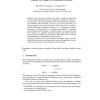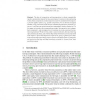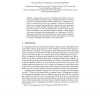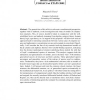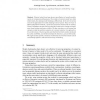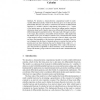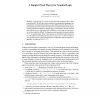FOSSACS
2005
Springer
15 years 6 months ago
2005
Springer
We present a general framework for logics of transition systems based on Stone duality. Transition systems are modelled as coalgebras for a functor T on a category X. The propositi...
FOSSACS
2005
Springer
15 years 6 months ago
2005
Springer
The idea of composition and decomposition to obtain computability results is particularly relevant for true-concurrency. In contrast to the interleaving world, where composition an...
88
Voted
FOSSACS
2005
Springer
15 years 6 months ago
2005
Springer
Language-based and process calculi-based information security are well developed fields of computer security. Although these fields have much in common, it is somewhat surprising...
121
click to vote
FOSSACS
2005
Springer
15 years 6 months ago
2005
Springer
The general aim of this talk is to advocate a combinatorial perspective, together with its methods, in the investigation and study of models of computation structures. This, of cou...
97
Voted
FOSSACS
2005
Springer
15 years 6 months ago
2005
Springer
Nominal calculi have been shown very effective to formally model a variety of computational phenomena. The models of nominal calculi have often infinite states, thus making model ...
88
Voted
FOSSACS
2005
Springer
15 years 6 months ago
2005
Springer
Abstract. An extension of the λ-calculus is proposed, to study historybased access control. It allows for security policies with a possibly nested, local scope. We define a type ...
103
click to vote
FOSSACS
2005
Springer
15 years 6 months ago
2005
Springer
Abstract. We introduce a domain-theoretic computational model for multivariable differential calculus, which for the first time gives rise to data types for differentiable functio...
105
click to vote
FOSSACS
2005
Springer
15 years 6 months ago
2005
Springer
Abstract. We study a process calculus which combines both nondeterministic and probabilistic behavior in the style of Segala and Lynch’s probabilistic automata. We consider vario...
108
Voted
FOSSACS
2005
Springer
15 years 6 months ago
2005
Springer
Separation logic is a spatial logic for reasoning locally about heap structures. A decidable fragment of its assertion language was presented in [1], based on a bounded model prope...
100
Voted
FOSSACS
2005
Springer
15 years 6 months ago
2005
Springer
Abstract. Nominal logic is a variant of first-order logic equipped with a “freshname quantifier” N and other features useful for reasoning about languages with bound names. I...
